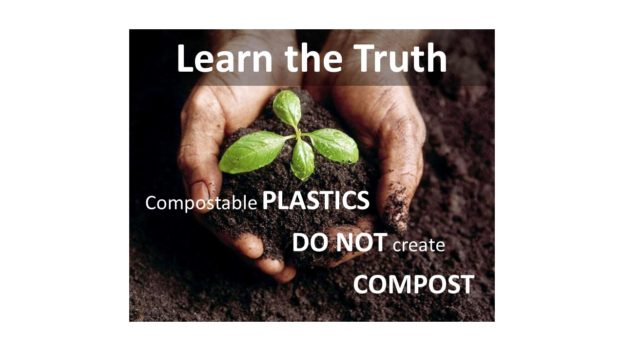If you are anything like me, you’ve no doubt heard about and thought about how wonderful the idea of compostable plastics sound. Plant based materials used as feedstock to make compostable plastics, that once used simply discard in the compost pile and voila, the plastics you just used has now become nutrient rich soil to help aid in the next generation of plant growth. It sounds so healthy and natural it must be good, right?
The major issue with “compostable plastics” is that they don’t make compost. What’s that, you say? That’s right, compostable plastics don’t breakdown and convert into compost or result in nutrient rich soil as the process and name would lead one to believe. This aspect of compostable plastics is extremely misleading. Let me explain.
The ASTM D6400 is the Standard Specification by which all compostable plastics strive to meet. Compostable plastics that claim to be certified compostable will no doubt have to pass the ASTM D6400 specification. Organizations like BPI (Biodegradable Products Institute) provide 3rd party certifications that a compostable plastic product meets the requirements of the ASTM D6400 standard specification. Even California has product labeling legislation that requires any plastic item claiming to be compostable must meet the ASTM D6400 Standard Specification in order to make such claims. But what exactly are the requirements for meeting the ASTM D6400 specification?
ASTM D6400 includes a handful of requirements that address things like soil toxicity, disintegration, heavy metals and biodegradation. To understand what is left after “composting” compostable plastics, (which is biodegradation in an environment that has oxygen readily available to micro-organisms) let’s take a look at the portion of the ASTM D6400 that addresses biodegradation the rate and extent required in order for a compostable plastic item to pass/fail.
The requirement for a material to pass ASTM D6400 and be considered “compostable” is that the material must reach or exceed 90% conversion of the carbon within the material into carbon dioxide (CO2). In other words, 90% or more of the material would need to be turned into CO2 (converted by micro-organisms) during the time-frame of the test – 180 days. Given this requirement to convert a minimum of 90% of the carbon within the sample compostable plastic item into CO2 (gas), simple math at this point would tell us that the remaining carbon (that’s part of what makes nutrient rich soil) would be equal to or less than 10% of the total carbon making up that compostable plastic item. So basically 90% of the item will simply go up into the atmosphere as CO2 gas, it will not remain behind as soil.
For those who are new to composting or compost, the purpose and result of a natural and healthy composting process is nutrient rich soil (compost). This soil is made up of various organic materials and nutrients; nitrogen, potassium, microorganisms, humus (a carbon rich material) and other forms of carbon. Carbon is arguably the anchor to having nutrient rich soil as it helps to retain moisture and provides a foundation for all other microbial processes for optimizing healthy plant growth. With less than 10% of the carbon in a “compostable plastic” remaining as soil, there is little to no value as nutrient rich soil. Even worse, 90% or more of it was converted to greenhouse gas and sent into the atmosphere.
Compostable plastics may “compost” (biodegrade by micro-organisms in an oxygen environment) if placed in the right composting environment, but they do not create compost (nutrient rich soil).

